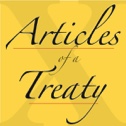Click the logo to go to the Articles of a Treaty
homepage
I always sign any treaty you ask me to do, but you have always made away with them - broke them. The whites always break them, and that is the way that war has come up. ‒IRON SHELL, FORT LARAMIE, APRIL 29, 1868
The treaty made in 1851 has not been settled with us as agreed. It has not been paid as stipulated, not for over five years past. ‒FIRE THUNDER, FORT LARAMIE, MAY 24, 1868
The 1868 treaty acknowledged that the Sioux are a sovereign nation. In my eyes, continuing the sovereignty of the Sioux Nation and ownership of the Black Hills are critical aspects that came out of signing the Fort Laramie Treaty, and the terms of the treaty are as valid today as they were in 1868. The United States Constitution, Article IV, Clause 2, establishes that treaties constitute the supreme law of the land. We must never forget this.‒TRACY HAUFF, OGLALA SIOUX TRIBE, 2019
I don’t believe this document was understood and the Sioux were pushed into signing it. Neither party came into the agreement true. Unfortunately we are still those people. The nation is built on this. We are still committing crimes against our neighbors for their differences. ‒ANDREA LEKBERG, OGLALA SIOUX TRIBE, 2019
Makoce ki le tawamakiyapi ca yuha iyotiyewakiyelo. [They made me the caretaker of this land, and I’m having a difficult time.] Eyas Oyate ki wolakota wan kagapi ca bluonihan kte lo. [But the people have made a peace treaty and I will honor it.] ‒GERALD YELLOWHAWK, CHEYENNE RIVER SIOUX TRIBE, 2019
Article 17. SUPERSEDES PREVIOUS TREATIES
This treaty supersedes all previous treaties, but only with regard to money, clothing and articles of property.
ARTICLE 17. It is hereby expressly understood and agreed by and between the respective parties to this treaty that the execution of this treaty and its ratification by the United States Senate shall have the effect, and shall be construed as abrogating and annulling all treaties and agreements heretofore entered into between the respective parties hereto, so far as such treaties and agreements obligate the United States to furnish and provide money, clothing, or other articles of property to such Indians and bands of Indians as become parties to this treaty, but no further.
Curriculum
